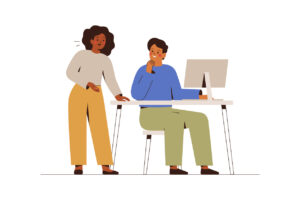Naomi Osaka’s statement on depression and anxiety shines spotlight on mental-health challenges in the workplace
As organizations struggle to balance business imperatives with their people’s mental health, a declaration by one of the world’s most famous athletes pushes the conversation forward.

When Naomi Osaka withdrew from the French Open this week, citing mental-health struggles, she brought a spotlight to a workplace challenge that organizations across the company are struggling with: An employee mental-health crisis, and how to deal with it.
Osaka, at 23 the world’s highest-paid female athlete, generated headlines across the world in a story that has lingered for days. “The best thing for the tournament, the players and my well-being is that I withdraw so that everyone can get back to focusing on the tennis going on in Paris,” she wrote in a social media post. “The truth is I have suffered long bouts of depression since the U.S. Open in 2018 and have had a really hard time coping with that.”
While Osaka’s workplace is not typical by any stretch, she quickly became the highest-profile example of what most observers characterize as a mental-health crisis in the American workplace, especially since the start of the pandemic in March 2020. Employees suddenly found themselves laid off or furloughed, and those who didn’t lose their jobs shifted to remote work. They found themselves isolated, struggling to balance work and personal responsibilities, with their children no longer physically attending school.
Organizations seeking to respond to this epidemic of stress realized the challenges associated with syncing organizational objectives with the mental-health needs of their employees, and even those with model programs struggled with employee reluctance to address these issues in the workplace, with their managers. “Companies have been adjusting to meet employees’ needs with more mental-health support and services in recent years, wrote the Wall Street Journal. “Yet Ms. Osaka’s announcement and subsequent tournament withdrawal highlights an especially thorny question: How can an individual’s mental-health needs be accommodated when those needs affect the ability to do parts of the job?”
There’s no doubt of the extent of the problem. A comprehensive national survey released recently by the advocacy organization Mental Health America found that:
- Most employees are experiencing signs of burnout.
- Employees are not receiving the support they need to manage stress.
- Workplace stress is severely impacting employees’ mental health.
- Employees are concerned about their current financial situations.
What’s more, three in five employees are not receiving adequate support from their supervisors to help manage stress, the report stated, and four in five employees feel emotionally drained from their work.

Then there’s a disconnect between what employers think they’re doing and what employees perceive. For example, recent research from Aon found that even when a company invests in a robust wellness strategy, with employee assistance programs, financial resources and retirement guides, health benefits and more, poor communication can dampen worker enthusiasm—or keep important offerings a secret. In the Aon research, only 13% of employers reported that they have no programs for “healthy living.” But 43% of employees believe no programs are offered to promote healthy living for workers. The same is true for emotional well-being, where 18% of employers reported they have no offerings, but 44% of employees believe there is no programming.
An earlier report found a wide gap in how employees and employers perceive investments in workplace wellness. The report, from Harris Poll and Just Capital, laid out how management and workers see big differences in whether their organizations put well-being and health above profits.
The good news is that many organizations are taking aggressive steps to counter the lingering perceptions and address their people’s mental-health issues. The giant insurance company Liberty Mutual recently laid out its strategy for bolstering worker resilience, and Thomson Reuters has worked to ensure that mental-health efforts are more equitable.
In the end, Naomi Osaka’s bold statement will surely help organizations and their people move forward on mental-health challenges in the workplace.






